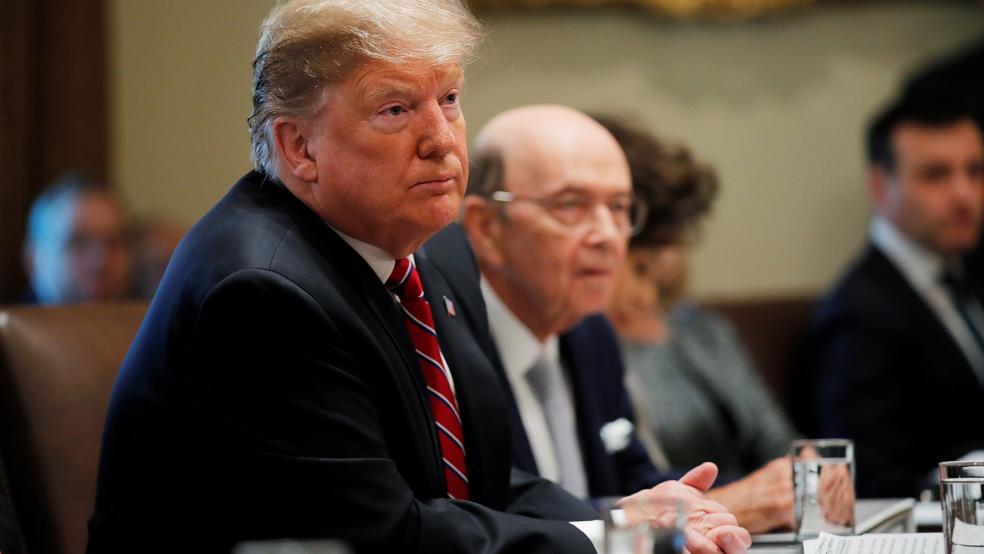Will he or won’t he?
After House and Senate negotiators reached a tentative agreement Monday night on a bipartisan border security deal, the looming question is whether President Trump will veto the deal, potentially sending the government toward another partial shutdown at the end of the week.
What’s in the deal: The text of the legislation wasn’t yet available, but the agreement reportedly would provide money for the unfunded portions of the government through the end of the fiscal year in September. It would increase spending by the Department of Homeland Security by $1.7 billion and provide $1.375 billion for 55 miles of barriers in the Rio Grande Valley in Texas, with some restrictions on the location of the new fencing.
That barrier funding is much less than the $5.7 billion Trump had demanded for the construction of more than 200 miles of wall — and less than would have been provided by an earlier Senate agreement for $1.6 billion and 65 miles of fencing, a deal that Trump rejected, resulting in the 35-day government shutdown. But it’s nearly three times as many miles as would have been funded under a continuing resolution.
The new agreement also reportedly would fund an average of 45,274 Immigration and Customs Enforcement detention beds over the rest of the fiscal year, with the intention of reducing the number of detainees to 40,520 by the end of the fiscal year — though Republicans say it maintains enough flexibility and funding to detain 52,000 immigrants, as requested in the president’s budget, and potentially as many as 58,500 beds. (You can find a more detailed explanation of the detention issue at Vox, CNN or The Washington Post.)
Will Trump sign off? During a Cabinet meeting at the White House Tuesday, the president said he didn’t like the deal — but he stopped short of saying he would reject it. “Am I happy at first glance? I just got to see it. The answer is no, I’m not. I’m not happy,” Trump said.
At the same time, he said a government shutdown is unlikely — though if one did happen, it would be Democrat’s fault — and that he would be “adding things” to lawmakers’ deal. “It's all going to happen, where we're going to build a beautiful, big, strong wall," he insisted.
“The next 24 hours will be critical as -- if history is any guide -- Trump will deploy his bespoke personal polling methods to key policy advisors in the media and anti-immigration grassroots,” Chris Krueger of the Cowen Washington Research Group wrote Tuesday morning.
Conservatives were quick to criticize the deal, and they have sway with Trump.
- Fox News host Sean Hannity: “Any Republican that supports this garbage compromise, you will have to explain.”
- Far-right firebrand Ann Coulter: “Trump talks a good game on the border wall but it's increasingly clear he's afraid to fight for it. Call this his ‘Yellow New Deal.’”
- Rep. Mark Meadows (R-NC), chair of the House Freedom Caucus: “This conference agreement is hardly a serious attempt to secure our border or stop the flow of illegal immigration. It kicks the can down the road yet again, failing to address the critical priorities outlined by Border Patrol Chiefs.” Meadows on Tuesday called for Trump to take executive action.
- Rep. Jim Jordan (R-OH): “While the President was giving a great speech in El Paso, Congress was putting together a bad deal on immigration.”
The most likely scenario: Trump will sign off on lawmakers’ deal, avoiding another shutdown, and then look to use executive action to “reprogram” money and start construction of additional border barriers — moves that could be met with legal challenges. “My guess is Trump will say something milquetoast about [the deal], we pass it, Trump signs it but then bashes it, and everyone regrets they ever voted for it,” a senior House GOP aide told Politico.
The president hinted that he’d pursue that path in his remarks to reporters, suggesting he would be “taking from far less important areas” to build his wall. Those areas, Krueger says, could include Army Corps of Engineers' flood control projects in Northern California and Puerto Rico as well as unspent military construction funds. Still unclear, he writes, is “how the White House will explain that instead of Mexico paying for the Wall, it will come from the troops and flood control projects in California and Puerto Rico.”
The bottom line: If that is the path that the White House chooses, the border spending fight won’t be over. It’ll just be entering a new phase, even as the threat of a shutdown will be resolved until fiscal 2020.





